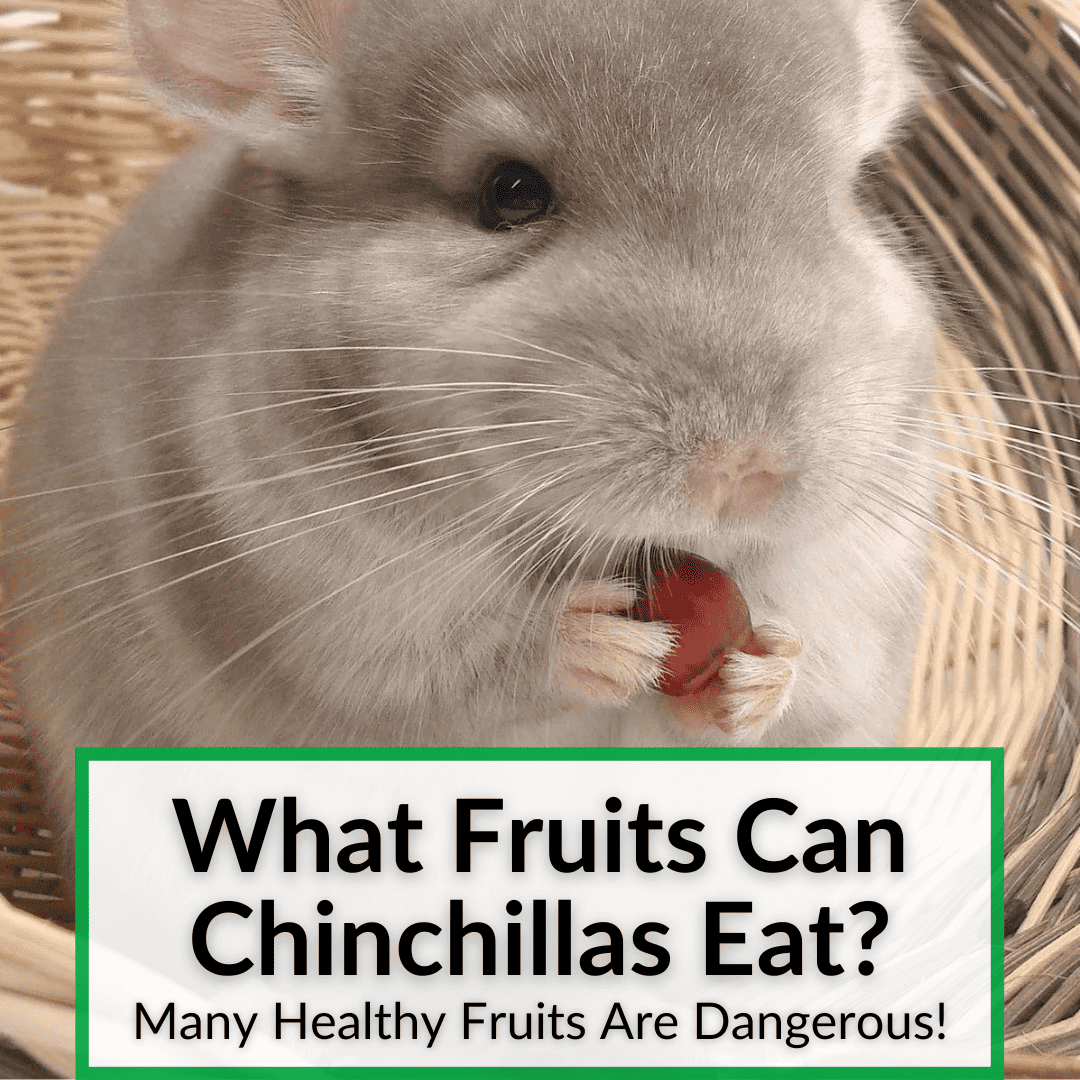
That means choosing what to feed it carefully.
One of the most frequent questions chinchilla owners ask revolves around chinchilla food and what chinchillas eat.
So, can chinchillas eat fruit?
They can, but when it comes to fruit, you need to be very careful.
Chinchillas can have some dried fruits. It is best to avoid fresh, water-based fruits.
Fresh, water-based fruits can cause diarrhea, which can be fatal.
Providing your chinchilla with the wrong fruits or the wrong quantities can also cause significant stomach issues and potentially even death.
Keep reading to learn how the most common fruits affect chinchillas, which ones are safe to feed, and which ones are not.
Contents
- 1 What Fruits Can Chinchillas Eat?
- 1.1 Safe Fruit For Chinchillas
- 1.2 Common Fruits For Chinchillas: Are They Safe?
- 1.2.1 Bananas
- 1.2.2 Can Chinchillas Eat Pears?
- 1.2.3 Peaches
- 1.2.4 Apples
- 1.2.5 Can Chinchillas Eat Green Apples?
- 1.2.6 Can Chinchillas Eat Apple Sauce?
- 1.2.7 Can Chinchillas Eat Apricots?
- 1.2.8 Can Chinchillas Eat Avocado?
- 1.2.9 Can Chinchillas Eat Cantaloupe?
- 1.2.10 Can Chinchillas Eat Papaya?
- 1.2.11 Can Chinchillas Eat Citrus?
- 1.2.12 Raspberries
- 1.2.13 Can Chinchillas Eat Clementines?
- 1.2.14 Grapes
- 1.2.15 Tomatoes
- 1.2.16 Can Chinchillas Eat Lemons?
- 1.2.17 Can Chinchillas Eat Kiwi?
- 1.2.18 Can Chinchillas Eat Mango?
- 1.2.19 Can Chinchillas Eat Mandarin Oranges?
- 1.2.20 Can Chinchillas Eat Oranges?
- 1.2.21 Can Chinchillas Eat Orange Peels?
- 1.2.22 Can Chinchillas Eat Honeydew Melons?
- 1.2.23 Can Chinchillas Eat Melons?
- 1.2.24 Can Chinchillas Eat Pineapples?
- 1.2.25 Coconut
- 1.2.26 Can Chinchillas Eat Watermelon?
- 1.2.27 Can Chinchillas Eat Tangerines?
- 1.2.28 Can Chinchillas Eat Figs?
- 1.2.29 Can Chinchillas Eat Plums?
- 1.2.30 Blueberries
- 1.3 Blackberries
- 1.4 Don’t Allow Fruit To Go Bad Before Offering To A Chinchilla
- 1.5 Offer Fruit Only On Occasion
- 1.6 Minimal Fruit For Chinchillas Is Always Best
- 1.7 Sugar Is Never Good For Chinchillas
- 1.8 Consider Oats And Other Alternatives
- 1.9 Don’t Make Sudden Changes To Your Chinchilla’s Diet
- 1.10 Monitor Behavior With Your Chinchilla If You Have Offered It Fruit
- 1.11 Never Feed A Sick Chinchilla Fruit
- 1.12 Understand What to Do If Your Chinchilla Doesn’t React Well To Fruit
- 2 Can Chinchillas Eat Fruit: Final Thoughts
What Fruits Can Chinchillas Eat?
Chinchillas can eat most fruit. But only in very small amounts. The high sugar and water content poses a problem, so you need to either severely limit how much you feed, or just avoid most fruit altogether
A chinchilla’s sensitive digestive system has trouble with excess water and sugar. And with such a small animal “excess” is not a larger amount. That is why fruits and vegetables can lead to serious problems. But not all of them.
We’ll begin with a large table that gives you a simple ‘yes’ or ‘no’ answer for the most common fruits. Yes does not mean to feed as much as you want. Tiny amounts only. No means the fruit is too risky to feed even tiny amounts. Best to avoid.
Below the table, we will list some safe fruits, before getting into more detail on the most common fruits and why they do or do not pose a potential problem.
| Fruit | Can Chinchillas Eat It? |
|---|---|
| Bananas | No |
| Pears | Yes |
| Green Apples | Yes |
| Apple Sauce | No |
| Apricots | Yes |
| Avovado | No |
| Cantaloupe | No |
| Papaya | No |
| Citrus | No |
| Clementines | No |
| Grapes | No |
| Lemons | No |
| Kiwi | No |
| Mango | No |
| Mandarin Oranges | No |
| Oranges | No |
| Orange Peels | No |
| Tomatoes | No |
| Honeydew Melons | No |
| Melons | No |
| Pineapples | No |
| Watermelon | No |
| Tangerines | No |
| Plums | No |
| Blueberries | Yes |
| Blackberries | Yes |
| Raspberries | Yes |
| Raisins | Yes |
| Dried Fruit | Yes |
| Cranberries | No |
| Cucumbers | Yes |
| Goji Berries | No |
| Rose Hips | No |
| Figs | No |
Like I stated previously, chinchillas have very sensitive stomachs. This is similar to their cousins, the degu.
This means we need to be educated and careful about what we decide to place in our chinchillas’ bellies. No worries, this isn’t a huge deal and we can work around it.
Before diving any deeper, you need to realize that offering fruit to your chinchilla should be a rare occurrence. Timothy hay, chinchilla formulated pellets and fresh water should be your chinchillas’ primary diet.
It’s always been like this and for a good reason, so stick to it.
You can offer fruit, but you should view it as a luxury. An occasional small treat for your chinchilla.
Not to mention, you have to be careful which fruits you are offering (refer to the table above in case you missed that section). Next, we will cover some safe fruits, before diving into more detail on all fruits.
First, here is a short video I’ve for those who prefer video content. In it, I discuss the potential safe fruits for your chinchilla.
Special Note: This video does not contain nearly the amount of information as this post does. It also does not get updated regularly like this article does. It’s purely to supplement information for those of you who prefer a quick video experience.
Here’s that video for you directly below👇
There is also a lot of crucial information about chinchilla care that you need to know, before you ever get to the point where you are offering your chinchilla any fruit. I put everything you need into a handy pdf guide.
This will be helpful for anyone who does not already have a care guide for their chinchilla. Here are the details.
😕Adopting and caring for a new chinchilla can be intimidating and confusing. It does not have to be so do not let it be.
Be sure to check out my full digital eBook “Avoiding Critical Mistakes Ultimate Chinchilla Care eBook” to have the best advice, tips, and tricks and supply recommendations to make adopting and caring for a chinchilla much more comfortable and easier to understand.
You can learn more about this eBook offer using the link directly below.
Learn more here:👉 Avoiding Critical Mistakes Ultimate Chinchilla Care eBook Offer
Safe Fruit For Chinchillas
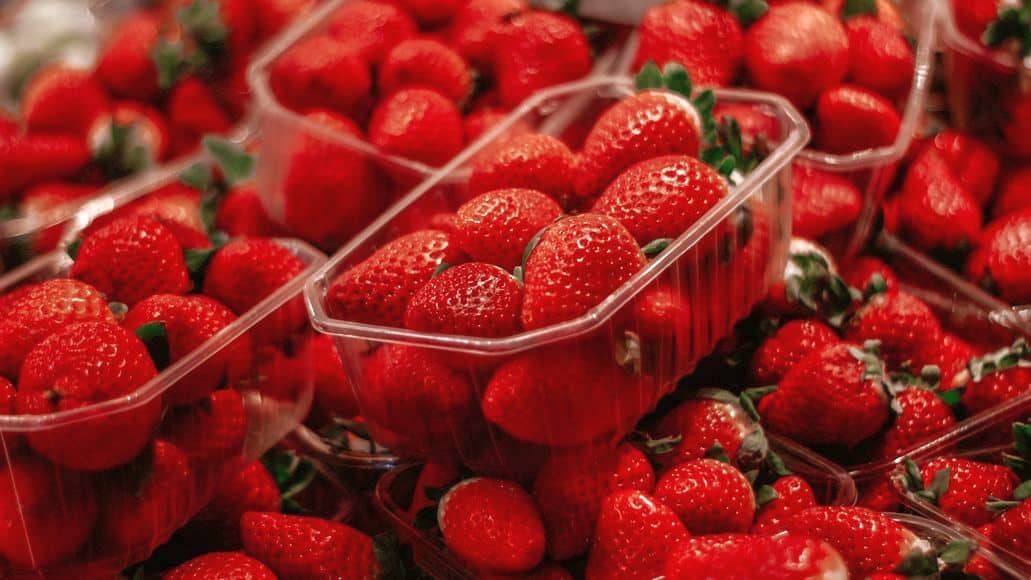
Chinchillas can eat strawberries, apples, and pears among a few others that made the list. However, you should feed these only occasonally and ideally as dried fruits.We generally advise to keep fresh fruits 100% off-limits. Period.
Of course, you can feed fresh fruits, but you need to limit the amount even more, due to the water content. The one exception is goji berries, but those are much better served died, too.
Some chinchilla owners prefer never to feed their chinchilla fruit. This isn’t necessarily because it will cause harm. It’s strictly because all of us chinchilla owners understand how sensitive and small a chinchilla’s stomach really is.
I’m right in the middle.
Some owners state that 3 to 4 treats per week are the max. I probably offer my chinchilla these fruits once a week. Twice at the absolute max.
In fact, I rarely use them unless I’m struggling to get her back into her cage. This is rare as well, but I do have times where she insists on running away from me non-stop.
This can be annoying but it’s certainly true. This is when I’ll bust out the heavy artillery.
A tiny piece of fruit.
It works like magic if you play your cards right. You also need to ensure you are following the best practices to implement when offering your chinchilla any fruit.
Always ensure you are following these three tips at a bare minimum.
- Tip #1: always feed small bite-sized fruit only (the size of a raisin or smaller, or 1 cm by 1 cm)
- Tip #2: no more than 2 to 3 times per week (this is 2 to 3 bite-size pieces of fruit per week)
- Tip #3: do not feed your chinchilla fruits that may cause harm (we will cover this more shortly)
Following these tips is a great start but we still have more ground to cover.
Let’s break down each of the most common fruits chinchilla owners often ask about one by one, to ensure we all have healthy chinchillas with no stomach issues.
I’m going to break down each and every one of these fruits in a question and answer format. This keeps things easy, 100% transparent, and easy to follow, so no questions are left unanswered in this post.
Common Fruits For Chinchillas: Are They Safe?
Below you will notice that I phrase every fruit as a question and attempt to answer the question about the fruits in the most direct manner possible.
I hope this style of post works and helps all of you understand what you can and can’t feed your chinchilla.
You will also notice a common trend with the fruits that chinchillas can eat and the fruits that chinchillas can’t eat.
The common ingredients that are present in fruits that could be damaging to your chinchilla and your chinchilla’s stomach include the following:
- High Acidity
- High Sugar Content
- High Calcium Content
- High Phosphorus Content
- High Fat Content
If certain fruits have much higher levels than other fruits in the above-mentioned categories, you should always avoided them and never feed them to your chinchilla. Here is a closer look at all of the fruits, as promised.
Bananas

No. Chinchillas cannot eat bananas.
Bananas are high in phosphorus. Bananas are also considered acidic and have high sugar, fat, and potassium content.
Your chinchilla may experience stomach pain or constipation consuming bananas. If bananas are offered, it must be at extremely low quantities.
Can Chinchillas Eat Pears?
Yes, chinchillas can eat pears.
If you offer your chinchillas pears it needs to be in small raisin-sized bites. 1 cm by 1 cm is the recommended size for fruit when offered to a chinchilla.
A pear in very small quantities and not offered too frequently will not harm your chinchilla.
Peaches
Chinchillas can eat peaches, but again, only in miniscule amounts. The same 1 by 1 cm piece as recommended above is appropriate here too. This is more or less a little chunk the size of a fingernail. The reason is, once again, a high sugar and water content.
Apples
Yes. Chinchillas can eat apples.
Apples will not cause harm to a chinchilla’s stomach, if offered in small quantities, small bites and not very often.
Apples will not cause your chinchilla to get sick unless it consumes too much, or consumes apples too often.
Can Chinchillas Eat Green Apples?
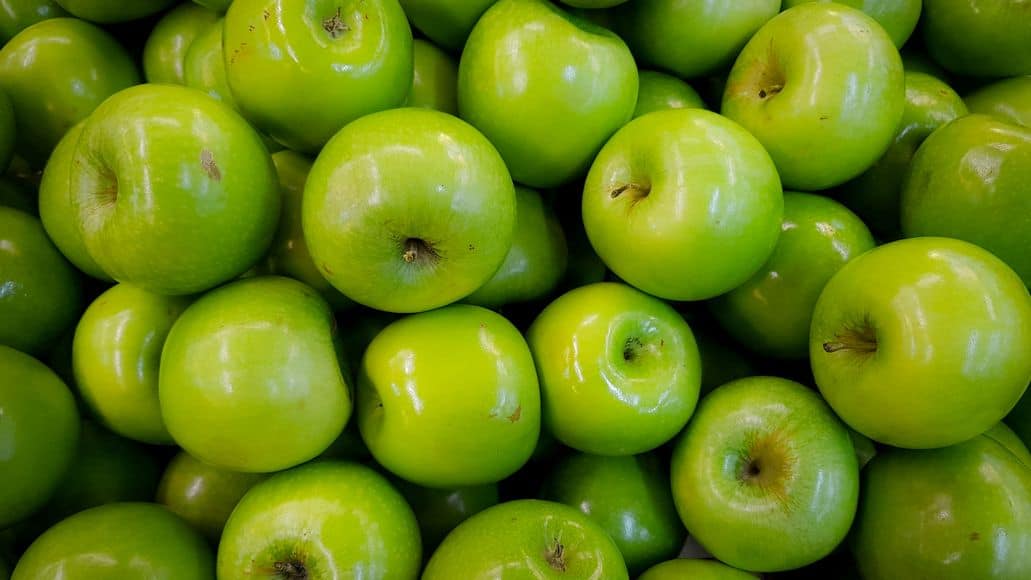
Yes. Chinchillas can eat green apples.
Chinchillas can eat green apples in the same manner chinchillas can eat red apples. But you can only offer your chinchilla green apples 1 to 3 times per week.
Additionally, you can only offer them 1 treat or green apple per day and it needs to be a very small serving. 1 cm by 1cm.
Can Chinchillas Eat Apple Sauce?
No. A chinchilla should not eat apple sauce.
Apple sauce contains even more sugar than apples. Additionally, apple sauce is soft food that isn’t recommended for chinchillas.
Apple sauce may cause an upset stomach, illness, or even digestive tract issues with your chinchilla.
Can Chinchillas Eat Apricots?
Yes, chinchillas can eat apricots. If you feed your chinchilla apricots, it needs to be dried apricots. Chinchillas love dried apricots.
You also need to ensure you only feed your chinchilla a very small amount of dried apricots and don’t feed your chinchilla dried apricots often. 1 to 3 times per week at max.
Can Chinchillas Eat Avocado?
No, chinchilla can’t eat avocados. Feeding your chinchilla avocados can cause digestive tract issues and stomach pain. Avocados contain nutrients that are not safe for your chinchilla to ingest and should be avoided.
Can Chinchillas Eat Cantaloupe?
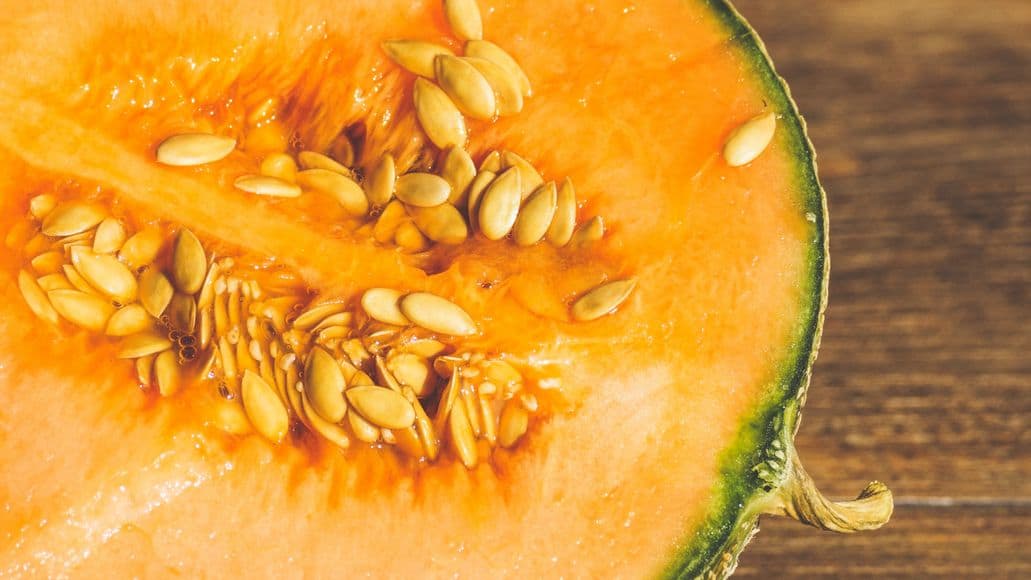
No, chinchillas can’t eat cantaloupe. Cantaloupe is too high in sugar and will cause stomach and digestive tract issues for your chinchilla. Additionally, cantaloupe can cause diarrhea and potentially further illnesses. Avoid feeding your chinchilla cantaloupe.
Can Chinchillas Eat Papaya?
No, chinchillas can’t eat papaya. It is basically the same as cantaloupe. It contains far too much water and sugar to be safe for your pet. Even a small amount can cause various digestive issues.
Can Chinchillas Eat Citrus?
No, chinchillas can’t eat citrus. Citrus fruits like oranges are too high in phosphorus, calcium, and sugar and are also highly acidic. You should avoid allowing your chinchilla to consume citrus to avoid stomach and digestive tract issues.
Raspberries
Yes, chinchillas can eat raspberries, but only in very small amounts. Like all berries, this one contains a lot of sugar and water. Never feed your pet more than a piece the size of a fingernail once or twice a week.
Can Chinchillas Eat Clementines?
No, chinchillas can’t eat clementines. Clementines are a citrus fruit, which means they are too high in acidic content. Additionally, clementines contain a lot of sugar, which can be damaging to your chinchilla’s health. Consider apples or dried apricots instead.
Grapes

Yes, chinchillas can eat grapes, but they shouldn’t. Grapes are a water-based fruit. Chinchillas can only consume very small amounts of any water-based fruit.
Water-based fruits often have too high an acidic content and sugar content for a chinchilla’s stomach and digestive systems. Ideally, chinchillas should never eat grapes, but if you do feed your grapes, limit it to a tiny amount. Or go with raisins instead.
Tomatoes
No, chinchillas can not eat tomatoes. They are far too acidic, plus they contain a lot of phosphorous (poisonous!), water, and sugar.
Can Chinchillas Eat Lemons?
No, chinchillas can’t eat fruits with a high acidic content.
Additionally, lemons contain a high amount of fat, phosphorus, sugar, and calcium.
All these nutrients can cause major illnesses and stomach issues for your chinchilla in addition to constipation or loose poop. Chinchillas should never eat lemons.
Can Chinchillas Eat Kiwi?
No, chinchillas can’t eat kiwi.
Kiwi is very high in acidic content and is also very sweet. Kiwi is a fruit to avoid and never offer to your chinchilla.
Offering your chinchilla kiwi could result in illness, stomach pain, and digestive issues. Feed your chinchilla an alternative safe fruit, instead of kiwi.
Can Chinchillas Eat Mango?
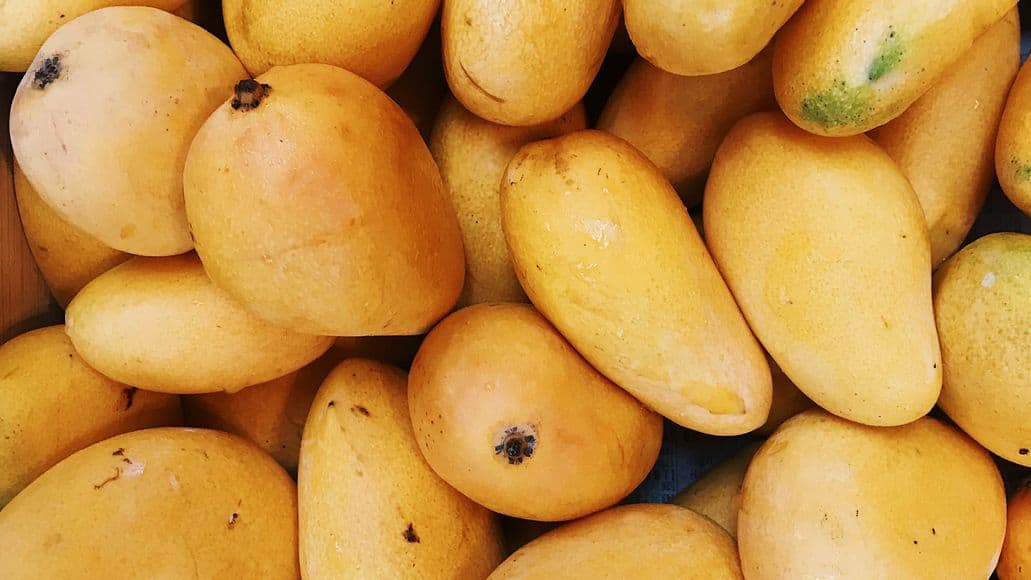
No, chinchillas can’t eat mango.
Mango is too high in sugar and contains other dangerous ingredients such as phosphorus and calcium that could upset your chinchillas’ stomach and potentially cause illness if given in too high quantities.
Can Chinchillas Eat Mandarin Oranges?
No, chinchillas can’t eat mandarin oranges.
Oranges and mandarin oranges are very high in acidic content. Additionally, mandarin oranges contain phosphorus and too much sugar to be offered to your chinchilla.
Avoid feeding your chinchilla mandarin oranges at all costs to avoid stomach pain and illness.
Can Chinchillas Eat Oranges?
No, chinchillas can’t eat oranges.
Like mandarin oranges, oranges have a high acidic level, too much sugar, and too much phosphorus.
If you feed your chinchilla oranges, you are likely to cause digestive issues, stomach pain, or other illnesses that may result in a vet visit. Avoid feeding your chinchilla oranges.
Can Chinchillas Eat Orange Peels?
No, chinchillas can’t eat orange peels.
While tempting, orange peels are too acidic to offer to your chinchilla.
Offering your chinchilla orange peels will likely cause it to fall ill, have stomach pains, or further complications. Always avoid oranges, mandarin oranges, and orange peels.
Can Chinchillas Eat Honeydew Melons?
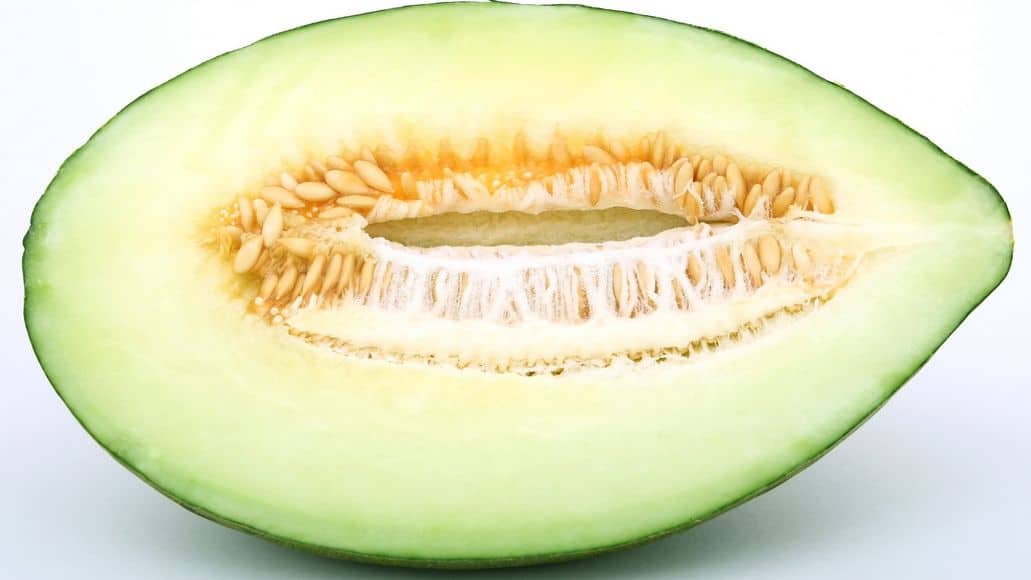
No, chinchillas can’t eat honeydew melons.
Honeydew melons are a water-based fruit. Chinchilla’s can’t eat any water-based fruit. This is due to high sugar content, high acidity levels, and often high phosphorus.
Avoid honeydew melon and water-based fruits to keep your chinchilla healthy.
Can Chinchillas Eat Melons?
No, chinchillas can’t melons.
Chinchilla’s can’t eat melons of any kind due to them being water-based. Water-based fruits are dangerous for chinchillas due to the nutrients contained within them.
Feeding your chinchilla melons will result in stomach pain and other potential health issues. Avoid melons at all costs.
Can Chinchillas Eat Pineapples?
No, chinchillas can’t eat pineapples.
Pineapples are a water-based fruit. Water-based fruits are off-limits and not advised to ever feed to your chinchilla.
Doing so will cause digestive issues, stomach pain, and even other potential illnesses. Pineapples and other water-based fruits should always be avoided.
Coconut
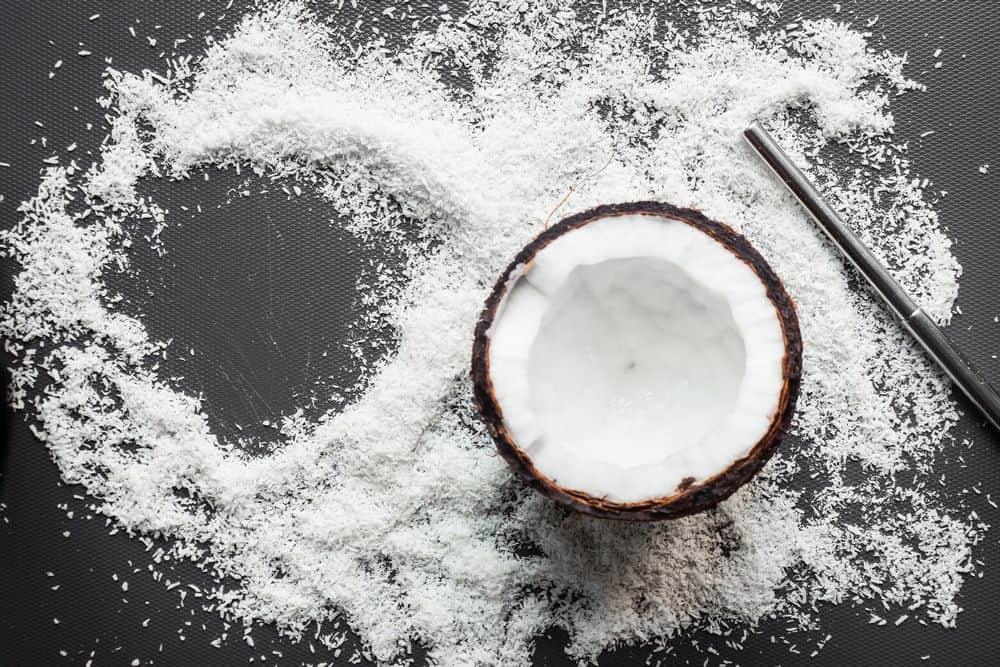
Yes, chinchillas can eat coconut. You can feed fresh or dried flesh, but fresh is better. Do not feed coconut milk or the husk, although you can give coconut husk to your chinchilla as a chew toy.
Can Chinchillas Eat Watermelon?
No, chinchillas can’t eat watermelon. Watermelon is another water-based fruit. It contains too much water, sugar, phosphorus, and acidity, all of which can harm your chinchilla’s stomach and digestive system. Do not feed your chinchilla watermelon to avoid health complications.
Can Chinchillas Eat Tangerines?
No, chinchillas can’t eat tangerines.
Tangerines are extremely sweet and highly acidic. Highly acidic and sweet fruits can damage your chinchillas’ stomach and digestive system.
This can cause soft stool, illness, and potential constipation. Always avoid tangerines and offer your chinchilla an alternative safe fruit.
Can Chinchillas Eat Figs?
No, chinchillas can not eat figs. In addition to a high sugar and water content, figs also have a lot of calcium, phosphorus and a high acidic content, all of which can cause serious digestive issues in chinchillas.
Can Chinchillas Eat Plums?
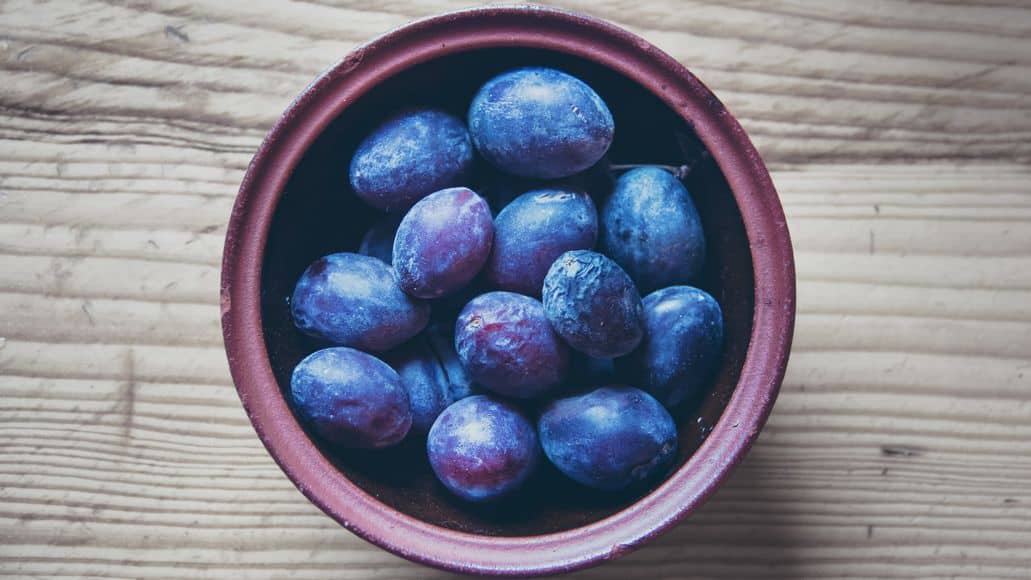
No, chinchillas can’t eat plums.
Plums are a water-based fruit. Additionally, plums contain fat, phosphorus, high calcium, and will cause bloating if your chinchilla eats them.
Avoid plums and offer your chinchilla a 1 cm by 1cm piece of an apple instead. Plums are not safe for chinchillas.
Blueberries
Yes, chinchillas can eat blueberries. But only small amounts. Limit it to a single blueberry once or twice a week. This fruit contains too much sugar for your chinchillas’ stomachs to handle more than that. It also has a high water content
Feeding your chinchilla too many blueberries will cause illness, digestive issues, and stomach pain. Do not feed your chinchilla more than the recommended maximum of one, once or twice a week.
Blackberries
Chinchillas can eat blackberries, too. But the same rules apply as for blueberries, due to the same reasons. Blackberries also contain a lot of sugar and water, so you should only feed your pet half a berry once or twice a week.
Raisins
Yes, chinchillas can eat raisins. However, you should only offer your chinchilla raisins in small quantities. If you feed your chinchilla raisins, it needs to only be 1 to 2 raisins per day, about 1 cm by 1 cm to be safe. Don’t offer your chinchilla raisins every day. Pellets and timothy hay are the only foods your pet should consume daily.
Can Chinchillas Eat Dried Fruit?
Yes, chinchillas can some dried fruit. Chinchillas should only eat dried fruit in very small amounts. This is due to high sugar and fat content.
While some dried fruit is safe and won’t cause harm to your chinchilla, you should only offer dried fruit as a treat and not in large amounts to keep your chinchilla healthy.
Can Chinchillas Eat Cranberries?

Yes, chinchillas can eat cranberries, but it is much better to avoid them. At least fresh ones. Dried ones are fine, in small amounts.
Cranberries are too high in sugar, fat, and phosphorous. Feeding your chinchilla cranberries is likely to cause stomach pain and other illnesses.
It is true that you can feed tiny amounts of cranberries, even fresh ones, but it is best to just always avoid cranberries for your chinchilla. Feeding them cranberries can easily make your chinchilla feel sick and there are far better fruits out there for your pet.
Now that we have broken down the fruits chinchilla owners most commonly inquire about, let’s touch on some final tips I have for you to ensure your chinchilla is always feeling top-notch and ready to have a blast.
Can Chinchillas Eat Rose Hips?
Yes, chinchillas can eat rose hips. But agan, only in small amounts. You want to limit it to 1 to 2 rose hips per week.
But overall, rose hips are actually one of the best fruits to feed a chinchilla. They contain vitamin C and they are safer than most other fruits, since they do not have as much water or sugar or other potentially harmful substances.
Don’t Allow Fruit To Go Bad Before Offering To A Chinchilla
Here’s another big tip. Don’t ever place dried fruit or plain fruit in your chinchilla’s food bowl or cage.
Your chinchilla doesn’t necessarily eat everything offered to it instantly as a dog might.
Leaving even safe fruit in your chinchilla’s cage can result in the fruit going bad before it gets consumed.
If this happens, by the time your chinchilla does decide to consume the fruit, it could be dangerous or spoiled.
If you are going to feed your chinchilla fruit, you should be present, only offering the fruit in very small bite sizes and not doing it very often.
This is the best practice and I highly recommend following it for safety and to avoid expensive vet bills in the future.
Offer Fruit Only On Occasion
My chinchilla loves some of the chinchilla safe fruit we have discussed during this post today.
However, I highly recommend using this to your advantage and not offering the fruit that is safe for your chinchilla very often and for no reason.
I only offer my chinchilla fruit if I need her to get back in her cage and she’s trying to jump around me or navigate away from me.
Additionally, I’ll offer my chinchilla a tiny piece of a safe fruit from time to time just to show love, but this is perhaps once a week and not very often.
The only additional treat I usually let my chinchilla have every other day and sometimes every day is dried oats.
Outside of the dried oats, pellets, and hay, my chinchilla doesn’t get offered much else. It’s not that I’m trying to be cruel or strict. I’m simply looking out for her health.
Minimal Fruit For Chinchillas Is Always Best
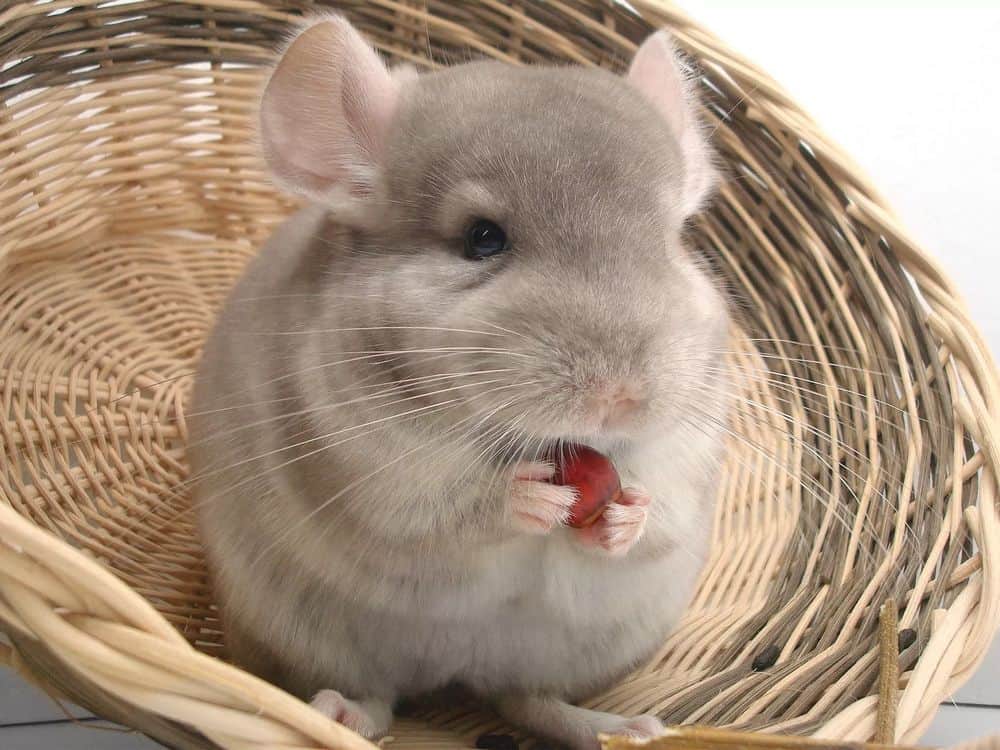
I enjoy having a healthy chinchilla that feels good each day.
Considering this is something that’s completely in my control, I try my best to remain ethical and not too lenient or generous with the treats I offer my chinchilla when I have her out for playtime.
Trust me, playtime, interaction and some bonding time with you as the owner is plenty enough to make your chinchilla happy.
Offering fruit isn’t going to get you as many brownie points as you may believe.
Sugar Is Never Good For Chinchillas
If you haven’t noticed by the fruits we went over above, sugar is the silent stomach killer for chinchillas.
Yes, other ingredients can also cause issues, for example acid, phosphorus, and fat, but sugar is the biggest no-no for chinchillas.
Always keep sugar at a minimum. Even with healthy sweet foods like bee pollen. Read “Can Chinchillas Eat Bee Pollen?” for more on this.
Providing your chinchilla with too much sugar is bound to cause an issue sooner or later but it’s easy to avoid. Better safe than sorry in these situations.
Chinchillas can be expensive enough for the first few weeks of owning them.
Trust me, you won’t want a vet bill being added to that list of expenses.
Relax, after the initial cost, chinchillas are very cheap and extremely easy to care for. Just get settled in and it all gets easier each day. Not to mention more fun.
Consider Oats And Other Alternatives

You may have noticed what I mentioned previously about considering other alternatives instead of fruits for your chinchilla.
I love offering my chinchilla a few dried oats instead of fruits or even dried fruits.
In all honesty, sticking to timothy hay and pellets is perfectly fine as well, but we know that’s no fun.
For safety, just keep fruit at small amounts and consider other safe alternatives.
Preferably alternatives that aren’t so high in sugar and that don’t have such a high chance of causing stomach issues with your chinchilla. And avoid dairy products. They might be rodents, but chinchillas should not eat cheese.
Again, being safe is always better than being sorry. Remember that.
Don’t Make Sudden Changes To Your Chinchilla’s Diet
Another key tip is to treat your chinchilla like you would treat your dog.
Dogs are known to get sick easily and their bellies get upset when you switch foods too quickly.
Treat your chinchilla the same way.
Never change your chinchillas’ diet randomly. Stick to the basics. Timothy hay and pellets and you will be just fine.
Changing your chinchillas’ diet is very likely to make it sick, cause it to not eat, or cause further health concerns.
Pick your chinchilla’s diet and stick to it to ensure it remains at peak health.
Monitor Behavior With Your Chinchilla If You Have Offered It Fruit
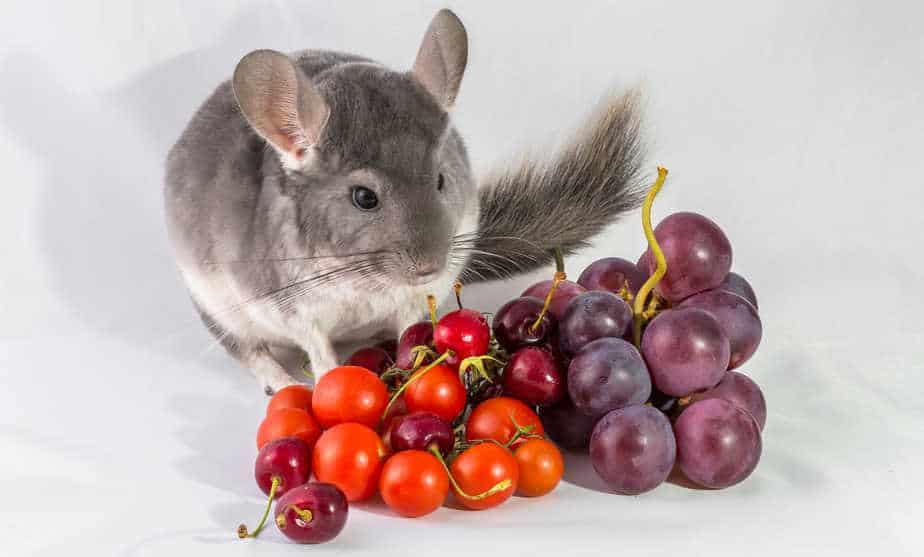
This may be one of the most important pieces of advice I can give you in this entire long post.
If you do decide to offer your chinchilla some of the safe fruits we have discussed, then you need to be paying attention.
Do not just offer it fruit, leave it in the cage, and go about your day.
Don’t offer it fruit and then leave for several days or for the weekend.
Keep tabs on the situation.
Make sure it is still pooping normally and at the normal high frequencies.
Make sure that the poop is still hard.
This is the best way to always protect your chinchilla.
Simply keep an eye on it and check in to ensure your chinchilla isn’t having a bad reaction to any of the fruit you have provided it.
This way, you can act quickly if something was off or is causing your chinchilla any discomfort.
Never Feed A Sick Chinchilla Fruit
In addition to keeping tabs on your chinchilla before an illness ever takes place, also ensure that you never get too cute or try and get fancy if you believe your chinchilla is ill.
Fruit will not cure your chinchilla if it doesn’t feel good.
The only thing that can help your chinchilla in this situation is calling a vet and getting it professional attention.
Additionally, if you ever think your chinchilla is sick, you need to ensure it remains cool and at the correct and cool temperatures to avoid overheating.
See a vet as soon as possible and always act quickly with a chinchilla.
In most circumstances, when a chinchilla falls ill, it can progress quickly so get into the vet and get the problem taken care of and get back to your everyday life.
Don’t worry, with proper care, chinchillas don’t get sick often.
Understand What to Do If Your Chinchilla Doesn’t React Well To Fruit
This plays back to my previous point.
If you do decide to get a bit risky with your fruit selection or maybe your chinchilla even reacts badly to a safe fruit, don’t sit on your thumbs.
It’s easy to notice if your chinchilla is not reacting well to a portion of a particular food.
It may become bloated, lethargic, stop pooping, or stop drinking its water.
If this happens, suck it up and let a vet step in and help you.
Make sure it’s a chinchilla qualified vet and let them remedy the situation and advise on the next best steps.
Don’t try and handle these situations yourself. Once again, better safe than sorry.
Can Chinchillas Eat Fruit: Final Thoughts
Hopefully, this post helped clear things up and give you an idea of what fruits your chinchilla can and can’t have.
With proper care and some basic common sense, chinchillas can make one of the most fantastic pets you can own.
Always avoid the fruits we advised against in this post. And if you ever have any doubts about what is safe or unsafe for your chinchilla, be sure to consult your vet.
They will know best and it’s always nice to have a professional opinion.
I’d love your feedback on this topic as well. What Fruits Do You Allow Your Chinchilla To Eat?
Do you have any other fruits you are curious about? Have you ever had your chinchilla react poorly to a fruit that’s on our list?
Be sure to share your stories and drop a comment below. As always, I appreciate you stopping by and so does “Chili”. See you next time!
Debbie Amner says
Good morning Josh,
Recently my little Chinchilla has been very sick. He’s in good hands with my vet at the moment and had been suffering with breathing problems, poor little man. After reading up on his health problems he’s recently been having this could be possible a fault of my own. He always enjoys eating a nut and I think that this is what has led him to the pain he is in now. Also after reading the above contents on what foods you had advised are good and bad again for Chinchillas I think I may have been giving him foods which he has enjoyed, but have been possibly bad for him. I have been giving him baby corn, sweet peas and the odd blueberry. Thank you for your advice on the do’s and don’t in foods as I have learnt a lesson from yourself today. I just hope that my little chin will be get better. I have written down the foods now only I should give from now on, but like you have mentioned above I will do this gradually avoiding the bad food and introducing more of the good food and chopping up in small amounts.
Thank you
Debbie
Debbie Johnson says
what can I feed the chinchilla as a treat he was not taken care of with the first owner and now he’s acting better but I need to know something I can give him as a treat